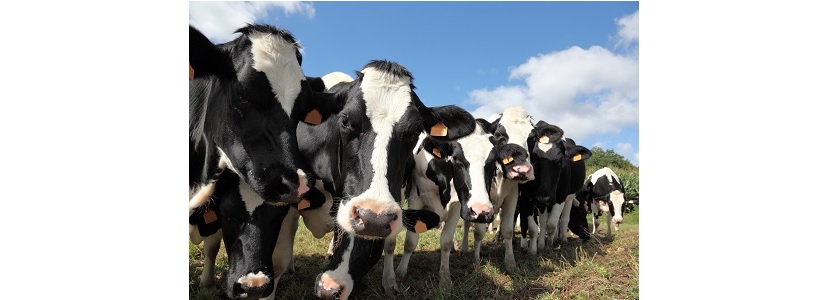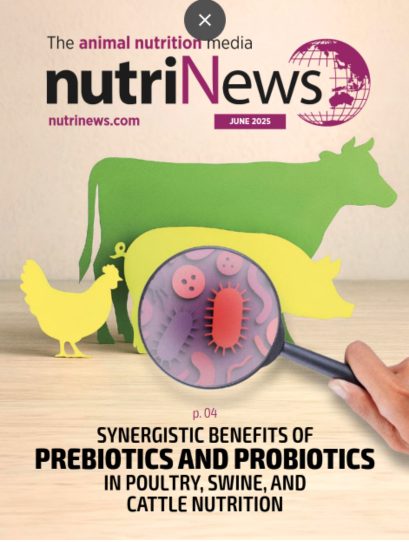Clinical deficiencies in B vitamins are extremely rare in dairy cows under normal feeding conditions because the ruminal microbiota synthesizes these vitamins. Nevertheless, improvement in lactation performance following B-vitamin supplementations suggests subclinical deficiencies which reduce metabolic efficiency. Even when cows are fed diets adequately balanced for energy and major nutrients, the need for these vitamins can sometimes exceed the supply from the diet and the synthesis by the rumen microbiota, especially in early lactation, when dry matter intake is low.

Due to their metabolic roles and interdependence, folic acid, and vitamin B12 are two B vitamins of interest for dairy cows. Folates, the biologically active forms of folic acid, provide one-carbon units for DNA synthesis affecting cell division for fetal and mammary development. Both vitamins, folates and vitamin B12, are critical for de novo synthesis of methyl groups for methylation of DNA, controlling gene expression, and methylation of phosphatidylethanolamine to generate phosphatidylcholine, the major phospholipid in membranes and lipoproteins.
Vitamin B12 also acts as a coenzyme in propionate metabolism, the primary source of glucose in dairy cows. The efficiency of folate and vitamin B12 metabolism depends on an adequate supply of both vitamins. On one hand, a lack of vitamin B12, even in the presence of an adequate folate supply, blocks the utilization of folates for DNA synthesis. On the other hand, a low folate supply interferes with the utilization of vitamin B12 for propionate metabolism.
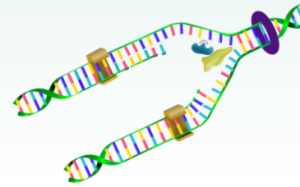
A survey of the scientific literature shows that a supplement of folic acid alone or combined with vitamin B12 increased or tended to increase yields of milk or energy-corrected milk in 14 out of 19 experiments and increased or tended to increase milk protein concentration in 8 experiments during early and mid-lactation. Milk yields of fat and protein followed a pattern similar to milk yield. Except for one experiment, the increase in milk, energy-corrected milk, or milk component yields observed with the vitamin supplementation changed neither dry matter intake nor body weight.
In some experiments, the supplements in early lactation decreased body weight or body condition loss. The improved lactation performance without increasing dry matter intake or mobilization of body reserves indicates that folic acid and vitamin B12 supplements, especially when given together, improve energy partitioning in dairy cows during early or mid-lactation.

A supplementation in folic acid and vitamin B12 increased glucose availability or decreased β-hydroxybutyrate plasma concentrations. In both cases, hepatic expression of MUT, the gene responsible for synthesizing the vitamin B12-dependent enzyme methylmalonyl-CoA mutase, was increased. To understand how it works, we need to remember that vitamin B12 is the coenzyme for a mitochondrial enzyme, methylmalonyl-CoA mutase, which converts methyl malonyl-CoA into succinyl-CoA, a critical step for the utilization of propionate. We must also remember that an adequate supply of folic acid is needed to enter vitamin B12 into the cell mitochondria.
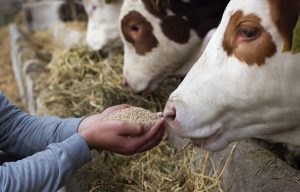
![]() An increased expression of MUT in the liver contributes to restoring an efficient propionate flux toward the Krebs cycle to form oxaloacetate. In other words, it improves the efficiency of the utilization of propionate absorbed from the rumen. Oxaloacetate could then be used for glucose synthesis or to complete the oxidation of fatty acids released during the mobilization of body reserves (Figure 1).
An increased expression of MUT in the liver contributes to restoring an efficient propionate flux toward the Krebs cycle to form oxaloacetate. In other words, it improves the efficiency of the utilization of propionate absorbed from the rumen. Oxaloacetate could then be used for glucose synthesis or to complete the oxidation of fatty acids released during the mobilization of body reserves (Figure 1).
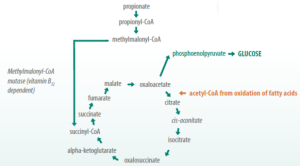
Figure 1. Propionate metabolism. Methylmalonyl-CoA mutase (in blue) is the vitamin B12-dependent enzyme allowing the entry of propionate in the Krebs cycle and its further metabolism for the synthesis of glucose (in green) or entry of acetyl-CoA (in red) in the Krebs cycle to complete oxidation of fatty acids released by mobilization of body reserves. A lack of oxaloacetate to accept acetyl-CoA leads to the formation of ketone bodies (not illustrated).
The latter, i.e., entry of acetyl-CoA into the Krebs cycle, prevents the accumulation of ketone bodies resulting from the incomplete oxidation of these fatty acids. The fate of oxaloacetate toward glucose synthesis or as an acceptor of acetyl-CoA to complete oxidation of fatty acids released during mobilization of body reserves is modulated by the cow’s energy balance. In both cases, an adequate supply of folic acid and vitamin B12 improves the efficiency of energy metabolism, either by promoting glucose synthesis or by increasing the amount of energy available due to the complete oxidation of fatty acids, avoiding the accumulation of ketone bodies.
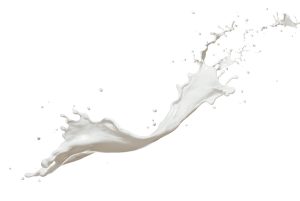
Providing adequate folic acid and vitamin B12 supply is also critical to stimulate milk secretion. Several experiments in different animal species, including dairy cows, showed that the folate receptor α, FOLR1, which allows entry of folates into mammary cells, is involved in the regulation of the growth phase of mammary tissues and is one of the critical genes controlling milk production and milk casein synthesis.
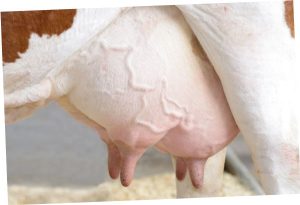
Folates could promote mammary epithelial cell development because of their role in synthesizing DNA constituents such as purines and thymidylate. They may also improve the metabolic efficiency of the mammary gland by increasing methyl group supply for phosphatidylcholine synthesis and promoting methylation of genes and their expression. The relative importance of these modes of action needs to be confirmed in vivo in dairy cows.

The imbalance between the need and the supply of the vitamins modulates the production and metabolic responses to folic acid and vitamin B12 supplementation. There is no further benefit to be expected from using supplements once the supply of both vitamins is adequate. Consequently, estimation of the B-vitamin supply, i.e., the summation of B vitamins from dietary ingredients escaping destruction in the rumen and B vitamins synthesized by the ruminal microbiota, is critical to predicting the risk of subclinical deficiency. As vitamin B12 is not present in plant materials, the supply of this vitamin is entirely dependent on its synthesis by ruminal bacteria as long as the dietary supply of cobalt (the central element of the vitamin B12 molecule) is adequate.
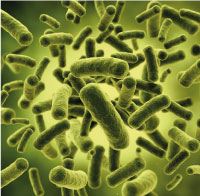
Empirical models showed that a non-negligible proportion of folates present in the dietary ingredients is not destroyed in the rumen and is available for the cow. The folate supply also increases with dry matter intake and dietary starch concentration, which stimulates the synthesis of the vitamin by the rumen microbiota.
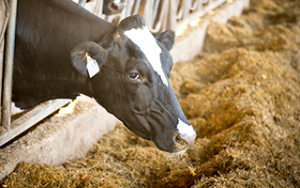
Dry matter intake also increases the vitamin B12 supply. However, increasing dietary starch concentration decreases the amount of vitamin B12 available for the cow due to a change in the ruminal bacteria population using the vitamin or producing analogs of the vitamin that are not biologically active for the cow, as observed in previous studies. The negative effect of dietary starch concentration on vitamin B12 supply is more significant than the positive effect due to increased dietary NDF concentration. Models are still being developed to refine the prediction of B-vitamin supply according to diet composition and nutritional management.
Conclusions
Improvement of lactation performance induced by folic acid and vitamin B12 supplements demonstrates that subclinical folate and vitamin B12 deficiency may occur in dairy cows, especially during periods of high metabolic activity, often coupled with negative energy and nutrient balances. The subclinical deficiency of one or both vitamins reduces the efficiency of energy metabolism and milk component synthesis. As knowledge is gained on nutritional factors affecting the supply of these two vitamins, it will be possible to identify precisely the contributing conditions leading to subclinical deficiency.
You may also like to read: “Vitamin B12: What is it for, benefits and where can it be found?”

